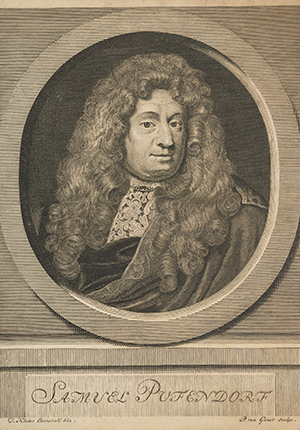Historic Document
The Whole Duty of Man According to the Law of Nature (1673)
Samuel von Pufendorf | 1673

National Galleries of Scotland, Bequeathed by William Finlay Watson 1886
Summary
Samuel von Pufendorf (1632-94) was a German jurist and author of On the Law of Nature and of Nations and Of the Duty of Man and Citizen (1673). Influenced by Grotius, Pufendorf examined natural law as applied to individuals and political communities. For Pufendorf, however, the source of natural law is found in the human need for “sociability”; natural law is a moral law inscribed in human beings by nature and knowable through natural reason. It prescribes obligations and concomitant rights, and it is the standard for all positive and civil law. Forcefully making the case for natural human equality and the moral requisites that ensue from a common humanity, he explicated a theory of rights generally derivative from obligations. Accordingly, Pufendorf rejected Hobbes’s notion of a natural right to all things. For many of the Founding generation, Pufendorf’s conception of natural and political right provided a striking contrast to Hobbes’ purely self-interested and amoral foundations of political order.
Selected by

Paul Rahe
Professor of History and Charles O. Lee and Louise K. Lee Chair in the Western Heritage at Hillsdale College

Jeffrey Rosen
President and CEO, National Constitution Center

Colleen A. Sheehan
Professor of Politics at the Arizona State University School of Civic and Economic Thought and Leadership
Document Excerpt
Ch. VII: The Natural Equality of Men to be Acknowledged:
I. Man is a Creature not only most sollicitous for the Preservation of Himself; but has of Himself also so nice an Estimation and Value, that to diminish any thing thereof does frequently move in him as great Indignation, as if a Mischief were done to his Body or Estate. Nay, there seems to him to be somewhat of Dignity in the Appellation of Man: so that the last and most efficacious Argument to curb the Arrogance of insulting Men, is usually, I am not a Dog, but a Man as well as your self. Since then Human Nature is the same in us all, and since no Man will or can cheerfully join in Society with any, by whom he is not at least to be esteemed equally as a Man and as a Partaker of the same Common Nature: It follows that, among those Duties which Men owe to each other, this obtains the second Place, That every Man esteem and treat another, as naturally equal to himself, or as one who is a Man as well as he.
II. Now this Equality of Mankind does not alone consist in this, that Men of ripe Age have almost the same Strength, or if one be weaker, he may be able to kill the stronger, either by Treachery, or Dexterity, or by being better furnished with Weapons; but in this, that though Nature may have accomplished one Man beyond another with various Endowments of Body and Mind; yet nevertheless he is obliged to an Observation of the Precepts of the Law Natural towards the meaner Person, after the same manner as himself expects the same from others; and has not therefore any greater Liberty given him to insult upon his Fellows.
Chapter VIII: Of the mutual Duties of Humanity:
1.Among the Duties of one Man towards another, which must be practis’d for the sake of Common Society, we put in the third place this, That every Man ought to promote the Good of another, as far as conveniently he may. For all Mankind being by Nature made, as it were, akin to each other; such a Relation requires more than barely abstaining from offering Injury and doing Despight to others. It is not therefore sufficient that we neither hurt nor despise our Fellows, but we ought also to do such good Offices to others, or mutually to communicate the same, as that common brotherly Love may be kept up among Men. Now we become beneficial to our Neighbour, either indefinitely or definitely; and that either parting with something or nothing our selves.




